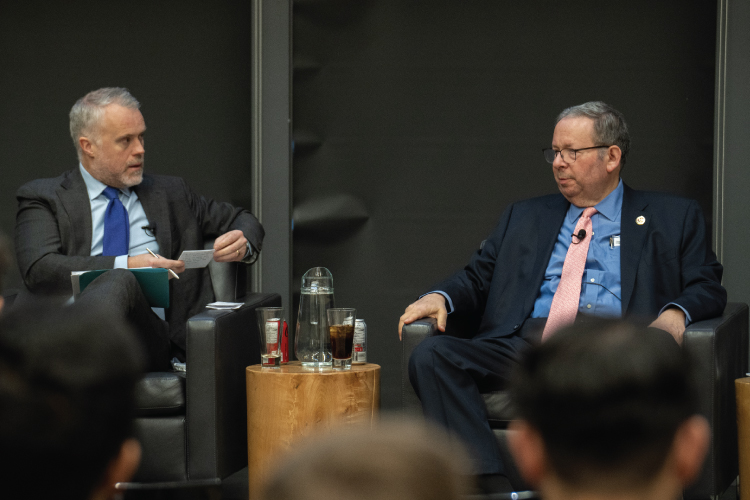As conflicts rage in various parts of the world, it’s natural to wonder: how did these wars start, and what is being done to end them? If peace should arise, what factors will ensure it lasts?
Though many of us would like to ask such questions of high-level political officials, it’s unlikely we’ll ever get the chance to do so.
And yet this winter, a fascinating speaker series provided a select group of students at the Munk School of Global Affairs & Public Policy with that very opportunity.
During January and February, five top diplomatic representatives from around the world visited the Munk School on successive weeks to describe their work as ambassadors and answer challenging questions from students in the Master of Global Affairs and Master of Public Policy programs.

Visiting speakers in the series included: Ambassador Mona Abuamara of the Palestinian General Delegation to Canada; H.E. Iddo Moed, Ambassador of Israel to Canada; the Honourable Bob Rae, Canada’s Ambassador to the United Nations; David L. Cohen, United States Ambassador to Canada; and H.E. Yuliya Kovaliv, Ambassador of Ukraine to Canada.
Though all of the ambassadors offered differing points of view, the events shared much the same format. Each began with an in-depth interview conducted by Munk School Director Peter Loewen, with many questions centering on the war in Gaza. In the events’ second half, students were invited to ask the ambassadors their own questions.

For Simranjeet Singh, who’s finishing his first year in the Master of Global Affairs program, the speaker series offered “a wonderful opportunity to gain rare insights from people involved in the day-to-day management of foreign policy and relations between different states.”
Singh admits that the meetings could certainly be contentious, given the difficult subject matter. But even within an atmosphere of disagreement, he believes the events modelled civil discourse.
“It’s very hard to have discussions where we can actually make progress and share opinions, and synthesize and understand those of others,” he says. “How do we have frank conversations without putting up barriers? The series gave us a mechanism to achieve this.”
Jamie Rockingham says that in addition to compelling subject matter, the ambassador series offered a master class in diplomatic relations.
“Hearing how the ambassadors articulated their thoughts and answered questions was an experience in and of itself,” says Rockingham, who’s just finished the first year of his Masters in Public Policy program.
Rockingham says the opportunity to challenge luminaries like Bob Rae was a great experience.
“We were sometimes putting their feet to the flame. And it was instructive to see them respond to questions in a format that was consistent and respectful.”
Singh says that while the ambassadors seldom veered from their key messages, the wide range of viewpoints shared in Munk School classrooms since the conflict in Gaza began has allowed students to construct a comprehensive picture of the war from a diplomatic point of view.
“I think the opportunity for these conversations is lovely,” he says. “Overall, I would view the speaker series as a great success that I hope will be repeated in future years.”
Before the series began, Rockingham says that the Munk School’s founding director Janice Stein “set the table” for some of the hard discussions to come. “She reminded us that we’re a student body that cares about each other — one that wants to make all students feel safe to engage in political discourse.”
He continues: “the empowerment to discuss the most difficult subjects within a classroom is shrinking, but this ambassador series is a clear initiative to increase that empowerment. And I think it was a success.”
In an effort to continue to cultivate civil political discourse, the Munk School is partnering with IE Madrid and France’s Sciences Po to launch a series of webinars: Scholars in dialogue: Six conversations on the modern Middle East from April 17–May 23. The objective is to share valuable information about Middle East politics, the war between Israel and Hamas, and the broader history of the region. Each panel will feature academic experts and be moderated by recognized journalists.

